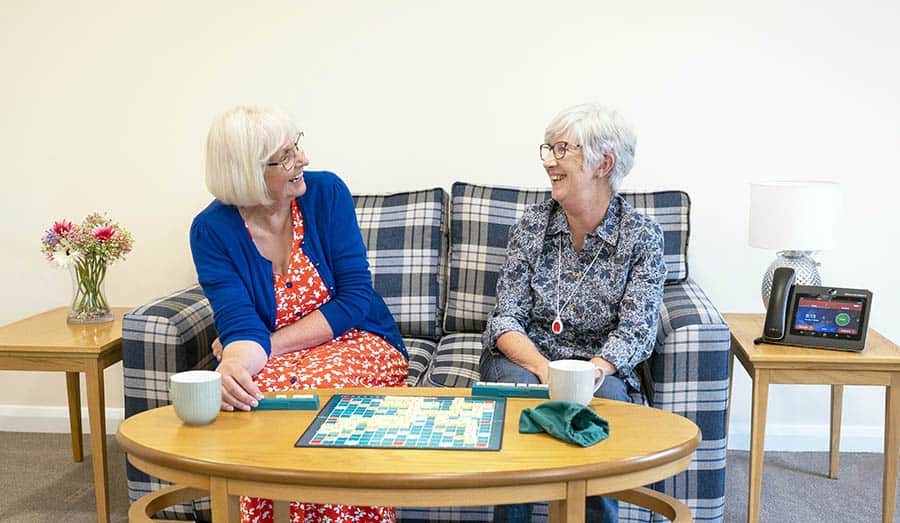EXCLUSIVE: Innovations within the health tech world and what the future holds for tech in our health and care services

In this exclusive guest article for AT Today, Gary Steen, CTO at Tunstall Healthcare, discusses innovations currently taking place in the health technology world, and what the future holds for the UK’s health and care services when it comes to the technology that is available.
The pressures on our health, housing and social care services require a radical review of how we provide life-changing support to end-users. Our ageing society, the recruitment and retention crisis in health and care, as well as pressure on public sector budgets, all move us ever further towards unsustainable levels of demand.
The need to provide innovation and technology development is no longer a ‘nice to have’, but a crucial part of ensuring we meet the challenges ahead as a society and enabling a cultural shift towards more preventative and outcomes-based approaches.
Breaking barriers
Technology has historically been seen as a barrier, and if health tech innovation is to be embedded into our services, cultural change is required which in turn needs early engagement. We must lead from the top to ensure stakeholders have input at an early stage into how digital innovation can help them and the citizens they support. There is still fear that needs to be addressed; stakeholders need to know that digital innovation is here to help, not replace them.
There is also a crisis due to an ageing population. Between now and 2040, there will be an extra six million over-65s. And this isn’t the only challenge. The move from analogue to digital is gathering pace and concern.
The benefits of digital innovation
TECS, or telecare systems, can be tailored to the needs of every user, helping to automatically monitor risks, such as falls or fires. These systems also offer vulnerable people the ability to call a specialist monitoring centre for help in case of an emergency, 24 hours a day. Such technology is scalable, cost-effective and helps individuals to remain independent for longer, as well as care to be person-centred rather than place-based.
Digital innovation can improve citizen experience, support better quality and greater reliability of service provision, and provide enhanced services that are tailored to meet specific needs.
These new approaches can benefit end-users as we continue to see innovation within the health tech sector. A reduction in the need to travel to appointments with clinicians or carers, real-time data provision, and a reduction in hospitalisation will all improve the outcomes for users, reduce costs, and enable more effective care provision. These benefits are only a hint of how health, housing and social care can be streamlined and strengthened if innovation and technology is placed at the heart of government plans.
The next generation of technology
The next step in innovation within the health tech sector will use advanced AI in combination with technology in the home and residential settings. This will support the more effective detection of whether someone’s health could be about to deteriorate, spot a potentially undiagnosed condition, or resolve an immediate social care need.
Using data from monitoring devices to identify worrying changes in behaviour and suggest the most appropriate course of action will be a key feature of the next generation of technology. It is designed to improve quality of life for more people, while reducing the number of GP visits, ambulance callouts, hospital admissions and demand for local authority-funded residential care.
The latest cutting-edge data-driven technology is able to respond to incidents and predict illnesses, while also preventing them from happening in the first place. Data can be taken from multiple sources, including motion sensors, smartphones, wearables and recordings, to provide a clear picture of the risks someone faces and alert their caregivers to respond if necessary.
New models of care will enable the UK Government and service providers to facilitate planned reforms using data insight and intelligent technology. Innovative systems have been designed to build on the successes that telecare and remote health monitoring have already delivered, enabling more person-centred, proactive and community-based care.
The future of digital health and care provision through innovation will build on the collaborations generated during the pandemic and shape a system that is better able to serve people in a fast-changing world. Government plans to deliver a new model of care that is centralised and standardised require a base level of digital functionality and acceleration in innovation if it’s to succeed.
The next steps
We must place a focus on innovation within the health tech sector and on the associated workforce development to foster organisational transformation and realise the full potential of technology to create services fit for the future. This will build on the successes of telecare and remote health monitoring, which have recently been deployed, and develop more person-centred, proactive care. This will also ensure that users experience real-world benefits and the ability to live a healthier and more independent life.
New technology must be developed with the upcoming PSTN to digital switchover in mind. This will support government plans and allow technology solutions providers to innovate in the sector to create a more robust and faster infrastructure, equipment status alerts, and greater capacity to cope with increasing demand for broadband and WiFi.
Innovation across sectors is propelling as emerging technology accelerates, and health tech must be amongst them. To move forward to the next generation of health tech, which realises its true potential, the digital transition must be included in innovation strategies. This will ensure we develop world-leading technology and services, create consistency across the country to improve outcomes for end-users, and ensure all health tech users are accounted for.
With the right frameworks in place, health, housing and social care can develop a holistic approach that focuses on individuals, their choices, and their health and care, with care delivered more effectively leading to improved outcomes.
Investment in innovation within the health tech sector is investment in infrastructure that will enable us to reconfigure and integrate our services. It’s essential that service providers and end-users are involved in the digital transformation of our services if the sector is to innovate, embrace technology successfully, and deliver new approaches that create benefits for users in a post-pandemic world.
For more information about innovation within the health tech sector, please visit www.tunstall.com


